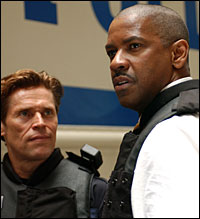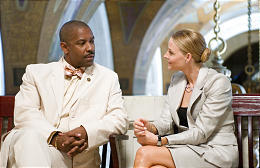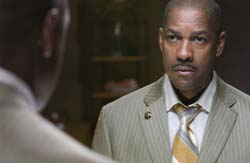 Inside Man (2006, Dir. Spike Lee):
Inside Man (2006, Dir. Spike Lee):
“As for why? Because I can.”
Slowly, almost imperceptibly, Spike Lee has evolved. The man who admonished us to Do the Right Thing, the director who brought the same “these are my peeps so I’m perfect for this job” brio to Malcolm X that Spielberg brought to Schindler’s List, the first mainstream NYC filmmaker to tackle what it actually means to live in post-9/11 New York (25th Hour), has expanded his world view past polemics to … a heist caper?
If you were in theaters during the 2005 holidays, you were likely exposed to two surprising trailers — one for Woody Allen’s Match Point (which played like Masterpiece Theater meets Fatal Attraction), and one for Spike’s Inside Man. The latter, with its swooshing pans of gleaming bank vaults and automatic weaponry, its verbal fencing between Denzel Washington and Jodie Foster, its intimations of showdowns and thriller mechanics, “big budget” seemingly imprinted on every frame — seemed a flat-out unlikely project for Lee. “Sellout,” in short. And even though we are informed by the main titles that this is indeed a “Spike Lee joint,” there is more than a bit of self-parody in the fact that Lee’s name in the credits is perched above two street signs, the intersection of Wall Street and Broadway. Yes, the man from Bed-Stuy has moved up to the Big Time.
The truth turns out to be trickier than that, thankfully. Inside Man is a fascinating melange of competing impulses. On the one hand, you have the frame of a nothing-is-what-it-seems thriller written by Russell Gewirtz, replete with criminal masterminds who have every possible angle covered, sweaty policemen racing against time to prevent the perfect robbery from … asleep yet? On the other hand, you have Lee presenting the whole affair within ironic quotations, taking pleasure in presenting New Yawk and New Yawkers in all their snarky, absurd, humane glory, slipping in cultural observations like dabs splashed on the canvas.
 The obvious precedent for all this is Sidney Lumet’s Dog Day Afternoon (which Gewirtz gleefully alludes to within the script): A band of determined thieves breaks into a bank, takes hostages, and plays a game of wits and nerve with the NYPD that becomes a flashpoint for an entire city. But while Lumet had Al Pacino in his prime, playing a character that descended the ladder from frazzled to hysterical, Lee offers up Clive Owen, who can brood with the best of them but has little to do other than inform the audience of his Nietzschean will to power — he’s an individualist with a .357 Magnum and a mushy American accent. We’re meant to appreciate this mastermind who masquerades as an employee of the Perfect Planned Painting company (“We never leave until the job is done”) and how he sets the NYPD’s finest tap-dancing to his will — yet the ultimate payoff to all this galavanting (secret documents and hidden valuables) is lackluster compared to the effort expended in pulling off his noisy little caper.
The obvious precedent for all this is Sidney Lumet’s Dog Day Afternoon (which Gewirtz gleefully alludes to within the script): A band of determined thieves breaks into a bank, takes hostages, and plays a game of wits and nerve with the NYPD that becomes a flashpoint for an entire city. But while Lumet had Al Pacino in his prime, playing a character that descended the ladder from frazzled to hysterical, Lee offers up Clive Owen, who can brood with the best of them but has little to do other than inform the audience of his Nietzschean will to power — he’s an individualist with a .357 Magnum and a mushy American accent. We’re meant to appreciate this mastermind who masquerades as an employee of the Perfect Planned Painting company (“We never leave until the job is done”) and how he sets the NYPD’s finest tap-dancing to his will — yet the ultimate payoff to all this galavanting (secret documents and hidden valuables) is lackluster compared to the effort expended in pulling off his noisy little caper.
Likewise, the story seems locked in its own head, resorting to stock cliches in depicting its true villains — those rich white millionaires behind the scenes with secrets to hide. It’s more than a bit ridiculous, since it asks us to buy a hale-looking Christopher Plummer as a slick upper-crust operator (no problem there) who would have to be more than 85 years old, not to mention the possessor of incriminating documents that any man in his position would have burnt eons ago. Not only that, we also have Jodie Foster as his representative, “Ms. White” (subtle). Her profession is never made clear, but she is apparently a “facilitator” with enough clout to push the mayor around (Mr. Koch and Mr. Bloomberg, beware Peter Kybart’s broad interpretation) and broker superdeals with Owen’s super-criminal. A plot device and nothing more, Foster struts around in heels and aggressive suits, all but smirking at her own duplicity. Whenever the film zeroes in on her or Plummer and their Ivy League skullduggery (Shakespeare and Baron Rothschild quotations are freely bandied about), it is painfully apparent that a cartoon is in progress.
 Thank goodness for Lee, the true Inside Man in this flick. Seeing this charade for what it is and dropping even the pretense of suspense, he explodes the genre from within. Almost from the start we are presented with flash-forwards detailing the aftermath of the heist, the police interrogating the rescued hostages, and instead of playing the “will they get away with it?” card, the film delves into the what and the how — What happened exactly? How did we get to this point? And even the what and the how pale against this movie’s true aim, which is to capture a snapshot of NYC circa 2005.
Thank goodness for Lee, the true Inside Man in this flick. Seeing this charade for what it is and dropping even the pretense of suspense, he explodes the genre from within. Almost from the start we are presented with flash-forwards detailing the aftermath of the heist, the police interrogating the rescued hostages, and instead of playing the “will they get away with it?” card, the film delves into the what and the how — What happened exactly? How did we get to this point? And even the what and the how pale against this movie’s true aim, which is to capture a snapshot of NYC circa 2005.
This brings us to Denzel Washington, who plays Detective Frazier, the yin to Owen’s yang. Cheerful yet hassled by his insistent girlfriend and a corruption charge ($140,000 worth of drug money gone missing), Frazier could be the cousin of Walter Moseley’s Easy Rawlins, the private dick who Washington brought to life in Carl Franklin’s Devil in a Blue Dress — quite wise to the unfairness of this world, and gifted with just enough guile and resourcefulness to land himself in deeper trouble. As the head detective placed on the case, we see the world through his eyes, and what a world it is, crammed with ethnic and racial tensions, recalcitrant cops, unsupportive higher-ups, and pressure-cooker days punctuated by all-too-brief respites at the deli around the corner. The plot dictates that Frazier is essentially a reactive character, forever a half-step behind Owen, but it is amazing to witness Washington (who couldn’t be a wallflower if he tried) infuse his role with depth and vigor. He may be chasing his own tail, but he won’t let you catch him sweat while he’s doing it. Affable and razor-sharp, one moment he brokers a truce with the SWAT team, and in the next he’s tormenting a witness (woe be to the interviewee who says his “throat is parched”), or locking laser stares with Foster’s Ms. White, or messing with a distraught elderly woman’s head (“Did you commit the robbery? … Naw, I was just playin’ with you”).
 There are dozens of these precious vignettes sprinkled throughout the movie. Some fall into the “incongruous and hilarious” category, such as a staid bank manager using Kanye West’s “Gold Digger” as his cell phone ring tone, or Owen counseling a kid hostage on video game violence. Others have the familiar tang of authenticity, such as the prime suspect who happens to be well-endowed (“You can’t hide quality”) and has a penchant for jabbering on the phone while waiting in line, or the smart-alecky construction worker who turns out to have a gold-digging Albanian ex-girlfriend who can translate a crucial recorded conversation — as long as the police rescind her purseful of parking tickets. And then there are the politically barbed moments that are a Lee specialty, as when a Sikh suspect is beaten down, his turban stripped from him, Frazier cracking wise when the man bellows about his civil rights: “I bet you can get a cab, though.” It is moments like these when Lee channels the spirit of Lumet, who whipped his characters in Dog Day Afternoon into a goofy frenzy, everyone butting heads and engaging in that very specific brand of New York obnoxiousness, elevating the proceedings to comic tragedy.
There are dozens of these precious vignettes sprinkled throughout the movie. Some fall into the “incongruous and hilarious” category, such as a staid bank manager using Kanye West’s “Gold Digger” as his cell phone ring tone, or Owen counseling a kid hostage on video game violence. Others have the familiar tang of authenticity, such as the prime suspect who happens to be well-endowed (“You can’t hide quality”) and has a penchant for jabbering on the phone while waiting in line, or the smart-alecky construction worker who turns out to have a gold-digging Albanian ex-girlfriend who can translate a crucial recorded conversation — as long as the police rescind her purseful of parking tickets. And then there are the politically barbed moments that are a Lee specialty, as when a Sikh suspect is beaten down, his turban stripped from him, Frazier cracking wise when the man bellows about his civil rights: “I bet you can get a cab, though.” It is moments like these when Lee channels the spirit of Lumet, who whipped his characters in Dog Day Afternoon into a goofy frenzy, everyone butting heads and engaging in that very specific brand of New York obnoxiousness, elevating the proceedings to comic tragedy.
 But while Lumet mined this material for its incendiary value, Lee wisely plays it for breezy laughs. In Dog Day Afternoon, the thieves’ objective — funding a sex change operation for Pacino’s lover — was of a piece with the frenzied narrative, something outrageous yet human. Nothing on that scale fuels Inside Man, besides some half-baked rhetoric about the haves (the rich white people) and the have-nots (everyone else) that even Lee must have found stale, so we’re left with the airless prospect of a criminal genius pulling off his perfectly planned robbery, and nothing more. But the film’s very weightlessness turns out to be a huge weight off Lee’s shoulders, freeing him to indulge in his usual camera tics (the jump cuts, the ever-present zoom-trolley shot), while he peppers the story with his witty observations on the urban condition. It all concludes splendidly, too: after enduring his trial by fire and emerging unscathed, Frazier is presented with the opportunity for a financially lucrative but legally squishy act, and as he ponders whether to Do the Right Thing, his girlfriend, in a wry nod to She’s Gotta Have It, wriggles on the bed, awaiting his presence, the two of them caught in an intimate tableau. Bank heists may come and go, but the push and pull between man and woman, need and desire, persists. Neither reinventing or abandoning his principles, Lee’s Inside Man is the work of a man on holiday. “Don’t bullshit a bullshitter,” Frazier warns Owen; Lee is happy to play along with the bullshit for his own ends.
But while Lumet mined this material for its incendiary value, Lee wisely plays it for breezy laughs. In Dog Day Afternoon, the thieves’ objective — funding a sex change operation for Pacino’s lover — was of a piece with the frenzied narrative, something outrageous yet human. Nothing on that scale fuels Inside Man, besides some half-baked rhetoric about the haves (the rich white people) and the have-nots (everyone else) that even Lee must have found stale, so we’re left with the airless prospect of a criminal genius pulling off his perfectly planned robbery, and nothing more. But the film’s very weightlessness turns out to be a huge weight off Lee’s shoulders, freeing him to indulge in his usual camera tics (the jump cuts, the ever-present zoom-trolley shot), while he peppers the story with his witty observations on the urban condition. It all concludes splendidly, too: after enduring his trial by fire and emerging unscathed, Frazier is presented with the opportunity for a financially lucrative but legally squishy act, and as he ponders whether to Do the Right Thing, his girlfriend, in a wry nod to She’s Gotta Have It, wriggles on the bed, awaiting his presence, the two of them caught in an intimate tableau. Bank heists may come and go, but the push and pull between man and woman, need and desire, persists. Neither reinventing or abandoning his principles, Lee’s Inside Man is the work of a man on holiday. “Don’t bullshit a bullshitter,” Frazier warns Owen; Lee is happy to play along with the bullshit for his own ends.


Comments
Jonathan David Jackson
I adore your film criticism. One of these days you must tell me what you think of a little film called KEN PARK.